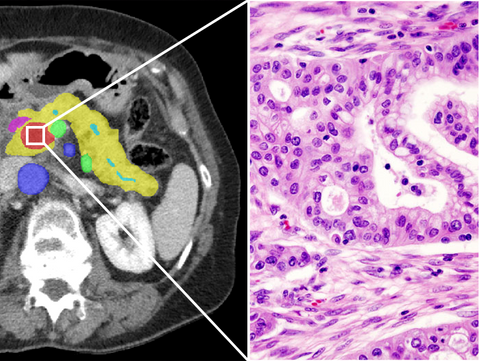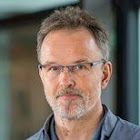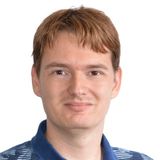
Background
Pancreatic cancer (PDAC) will soon become the second leading cause of cancer-related death in Western societies, worldwide half a million deaths per year. PDAC has the lowest survival of all cancers (median survival time 4.6 months, with patients losing 98% of their healthy life expectancy). The biggest challenge in the management of PDAC and new treatment development is the current inability of patient stratification. PDAC research in genomics, pathomics, and radiomics is scattered and limited, and it is not impacting PDAC healthcare.
Genomics technologies such as next-generation whole-genome sequencing (WGS) and liquid biopsy (ctDNA) are emerging, but not yet routinely used in PDAC diagnosis. Major R&D investments in prostate, lung, and breast cancer have resulted in stabilizing or decreasing mortality. No evidence-based personalized medicine approach for PDAC is currently available in the clinical practice.
Artificial Intelligence (AI) is transforming the field of healthcare. Worldwide interest in artificial intelligence (AI) is high and snowballing, fuelled by the availability of large datasets (“big data”). A new EU project (PANCAIM) aims to pool PDAC omics research data with medical imaging using AI to make an impact on PDAC patients and healthcare.
In Radboudumc, PANCAIM aims to apply AI to PDAC medical imaging (CT, MR, Pathology). Radboudumc is a clinical expert on PDAC and technical expert in the field of deep learning/AI in medical imaging for over 20 years.
Requirements
We are looking for a creative and enthusiastic researcher with an excellent MSc degree in a relevant field, such as medical image analysis, computer vision, or machine learning or medical degree with serious experience in programming and deep learning.
You have the ambition and academic skills to write and present scientific papers. Substantial experience with deep learning and good programming is essential and should be evident from the (online) courses you've followed, projects you've done, and your GitHub account. Experience in developing / exploring medical image analysis algorithms and a strong affinity with medical topics.
Terms of employment
You will be appointed for four years as a PhD student with the standard salary and secondary conditions for PhD students in the Netherlands. The research should result in a PhD thesis.
Organization
You will work at the Diagnostic Image Analysis Group (DIAG) in collaboration with the clinical PDAC research group. DIAG is a research division of the Departments of Medical Imaging and Pathology of the Radboud University Medical Center Nijmegen. DIAG currently has 50 deep learning researchers focused on various medical image analysis topics. The focus of DIAG is the development and validation of novel methods in a broad range of medical imaging applications. Research topics include image analysis, image segmentation, machine learning, and the design of decision support systems. Application areas include neuro, breast, prostate, lung, pancreas and retina imaging and digital pathology.
Key to the success of the group is close cooperation with clinicians. A team of scientific programmers is supporting our deep learning research, maintaining a large cluster of computers equipped with high-end GPUs for large-scale experimentation.
Information
For more information please contact Henkjan Huisman or Geert Litjens by e-mail.
Application
Please apply here!


